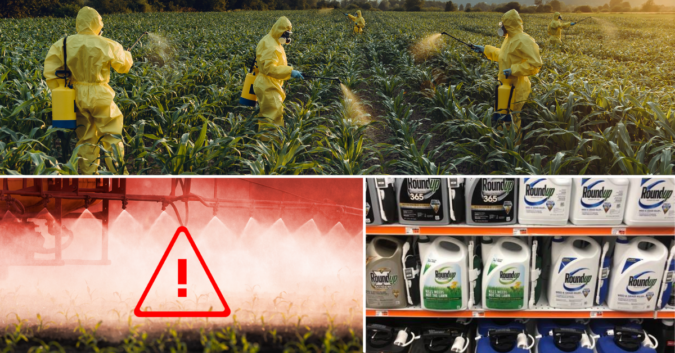On Thursday, July 29, pharmaceutical giant Bayer A.G. announced on an investment call that it intends to replace the herbicide glyphosate — the active ingredient in the popular weedkiller Roundup® — from all lawn and garden products sold on the U.S. market by the beginning of the year 2023. The company also plans to set aside $4.5 Billion for any future glyphosate-related lawsuits.
Bayer acquired Monsanto, the original makers of Roundup, in 2018, and, in doing so, inherited nearly 100,000 Roundup lawsuits against Monsanto. Many of these lawsuits allege that glyphosate caused the development of the claimants’ non-Hodgkin’s lymphoma due to high levels of exposure to the weedkiller.
In addition, plaintiffs allege that Monsanto and/or Bayer failed to warn them about the health risks associated with Roundup’s active ingredient.
Glyphosate is marked as a “human carcinogen” by the World Health Organization (WHO) and its cancer research arm, the International Agency for Research on Cancer (IARC), as well as a number of other national and international health organizations.
In 2019, the European Commission (part of the EU) announced that it will outlaw glyphosate by December 2022.
The 5-Point Plan to Rid the American Market of Glyphosate
Bayer’s decision to remove glyphosate-containing products from the American consumer market comes as part of a 5-step plan that was recently developed by Bayer in an effort to limit the company’s overall litigation risk.
Speaking to the decision, Bayer CEO Werner Baumann told shareholders during the investment call:
“It is important for the company, our owners, and our customers that we move on and put the uncertainty and ambiguity related to the glyphosate litigation behind us.”
Baumann also took the opportunity to reiterate what he and Bayer spokespeople have been saying for years, since the beginning of the Roundup litigation: The glyphosate-containing herbicide is not harmful to human health, despite a great many scientific studies indicating otherwise.
On par with this sentiment, Bayer also released a statement noting that the company’s decision was made “exclusively to manage litigation risk and not because of any safety concerns.”
For years, Roundup has been one of the most popular — and profitable — herbicides available. But as studies emerged demonstrating glyphosate’s allegedly harmful side effects, lawsuits against the makers of Roundup skyrocketed.
Bayer has since agreed to pay over $10 Billion to settle roughly 96,000 Roundup cancer lawsuits across the United States.
In May 2021, when Federal Judge Vince Chhabria of the Northern District of California denied Bayer’s proposal to settle all remaining lawsuits through a similar class settlement, the company made public a 5-point plan to address future Roundup lawsuits.
According to the company website, their plan is outlined as follows:
- Develop a website dedicated to promoting studies demonstrating the safety of glyphosate
- Discuss with retailers and distribution partners the future of glyphosate products and their availability to residential consumers
- Create an independent Science Advisory Panel to assess Roundup’s safety while exploring alternate solutions to address future Roundup lawsuits
- Reassess settlement possibilities with Roundup claimants to bring an end to litigation and liability risk
- Move forward with the appeals process on legal claims against Bayer and its glyphosate-based Roundup
It’s certainly worth noting that Bayer intends to keep glyphosate available for agricultural and professional users in the United States. The move to pull glyphosate-based Roundup from the U.S. market only affects retailers that sell the product to ordinary consumers.
How Glyphosate Can Cause Harm
IARC first classified the chemical compound glyphosate as “probably carcinogenic to humans” in a July 2015 report, stating:
“Two large case-control studies of NHL [non-Hodgkin’s lymphoma] from Canada and the USA, and two case-control studies from Sweden reported statistically significant increased risk of NHL in association with exposure to glyphosate.”
Much of the litigation levied against Bayer involves victims who have developed non-Hodgkin’s lymphoma — a type of cancer of the lymphatic system that forms when the body creates too many abnormal white blood cells.
Those most at risk of developing non-Hodgkin’s lymphoma are people who are regularly exposed to Roundup through frequent applications or contact.
Agricultural workers are most likely to be exposed to glyphosate, as well as those in any of the following occupations:
- Farmworkers
- Garden center and nursery workers
- Gardeners
- Groundskeepers
- Horticulturists
- Landscapers
About Bayer’s decision to pull glyphosate from the U.S. home and garden market, Center for Food Safety (CFS) Executive Director Andrew Kimball said in a statement:
“Bayer’s decision to end the U.S. residential sale of Roundup is a historic victory for public health and the environment. As agricultural, large-scale use of this toxic pesticide continues, our farm workers remain at risk. It’s time for the EPA to act and ban glyphosate for all uses.”
Soon, the chapter of glyphosate will come to an end in the United States and Europe. Without a doubt, this is great news for consumers, and it’s high past time. Roundup will still remain on store shelves, however, and as for the product’s active ingredient — glyphosate — it remains to be seen what exactly will replace it.
Bayer currently faces 30,000 Roundup legal claims.
